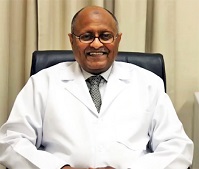Ahmed Bashir
Al Mana General Hospital, Saudi Arabia
Title: Towards a uniform newborn screening panel in the kingdom of Saudi Arabia

Biography:
Abstract:
Newborn Screening, involves a complex set of interlocking systems that use population based screening test panels to identify newborn with condition that may benefit rapid identification and treatment. The American College of Medical Genetics (ACMG) outlines the minimum criteria for which disease should be tested.This paper will briefly review the importance of Newborn Screening and will discuss its application in Saudi Arabia. It will briefly review test for:
- hyperphenylalaninemia (PKU)
- Tandem Mass Spectrometry (MS/MS)
- Amino Acids
- Organic acid metabolism
- Fatty acid oxidation
- Biotinidase deficiency
- Congenital Hypothyroidism (CH)
- Congenital Adrenal Hyperplasia (CAH)
- DNA-based Techniques
- Array
- Sequencing, multiplex PCR
- Multiplex for:
- Hemoglonobinopathies
- Transferrin Isoelectrofocusing (Tf-IEF) for congenital disorders of glycosylation (CDG)
- Nanochip system for heteozygote detection in Premarital Genetic Diagnostics (PGD)
- High Performance Liquid Chromatography (HPLC) for Amino Acids Analysis (AAA)
These methods were used in this study.
Birth rate between 500,00-800,000 annually, with high prevalence of some inherited conditions due to high rate of consanguineous marriage, large families, multiple marriages, tribal communities, condensed and cities and empty rural areas. High rate of hemoglobinopathies, metabolic, neurogenic, genetic diseases. The following diseases are common in Saudi Arabia; Glutaric Academia, Hemoglobinopathies, Cystic Fibrosis (CF), Congenital Adrenal Hyperplasia (CAH), Glucose-6-Phosphate Dehydrogenase Deficiency (G6PD-D). Ministry of Health (1991), King Faial Specialist Hospital (2005), Prince Salman Disability Research Center (2005), covering one of five regions, testing only 25% of the population.